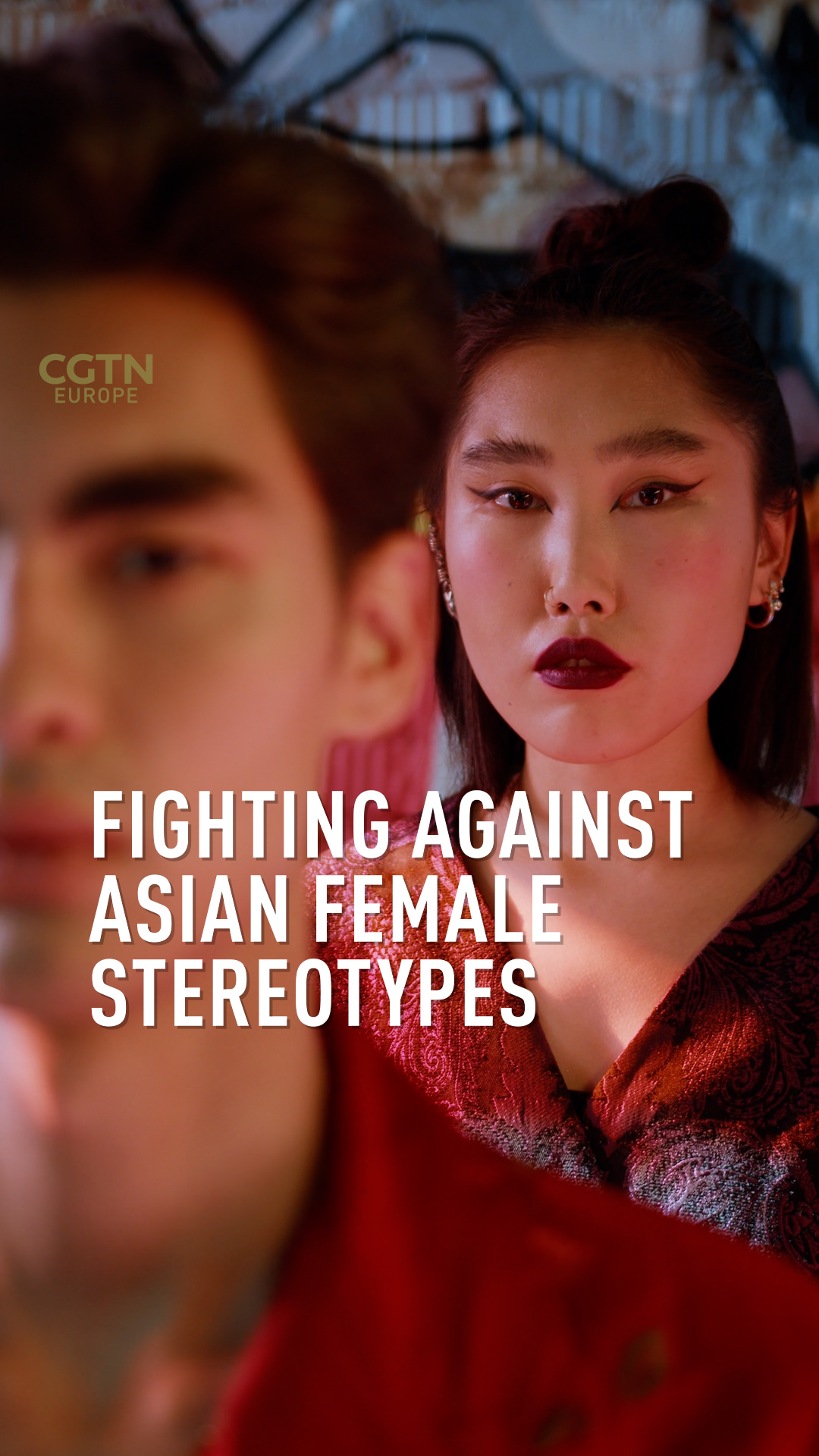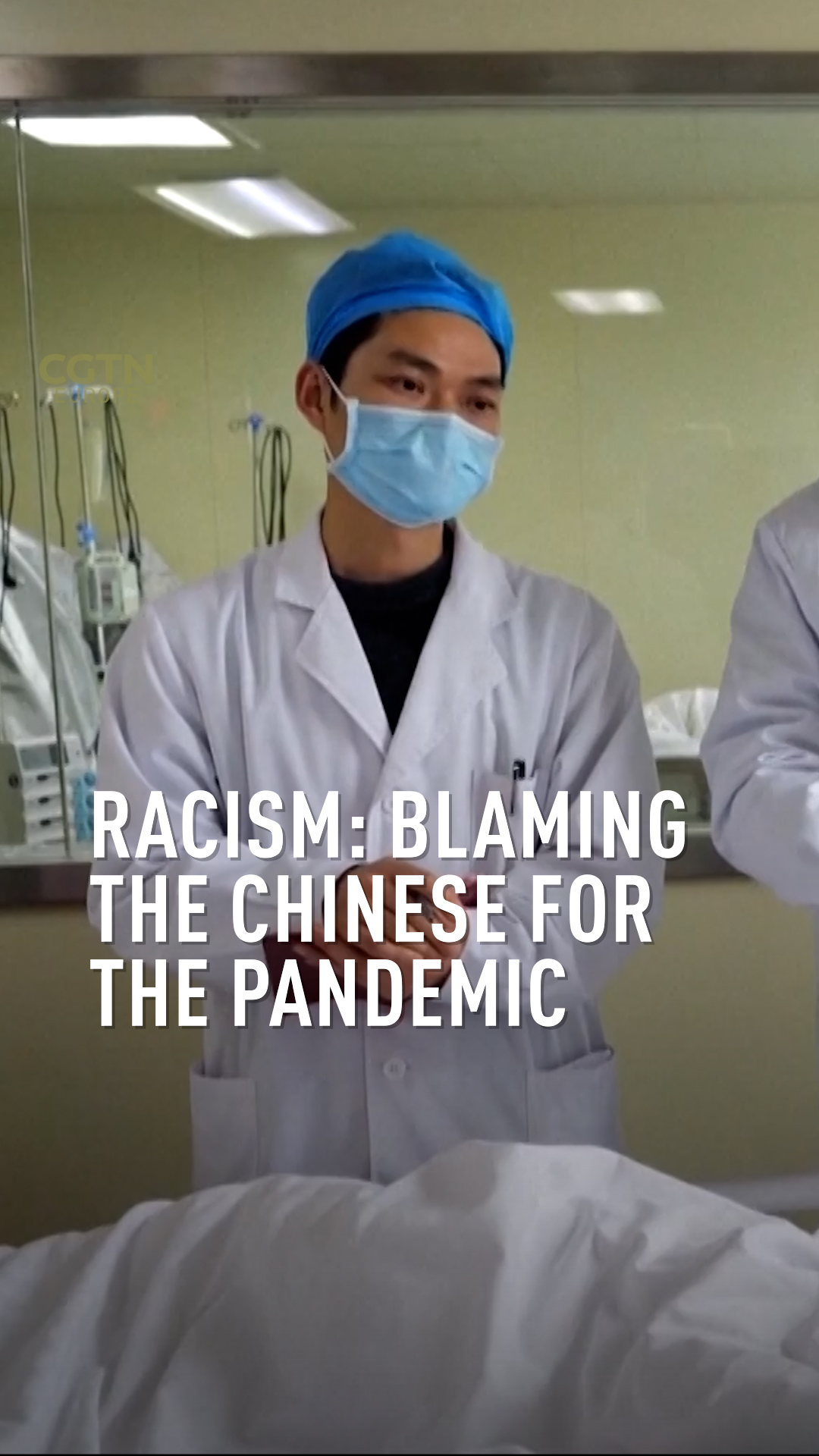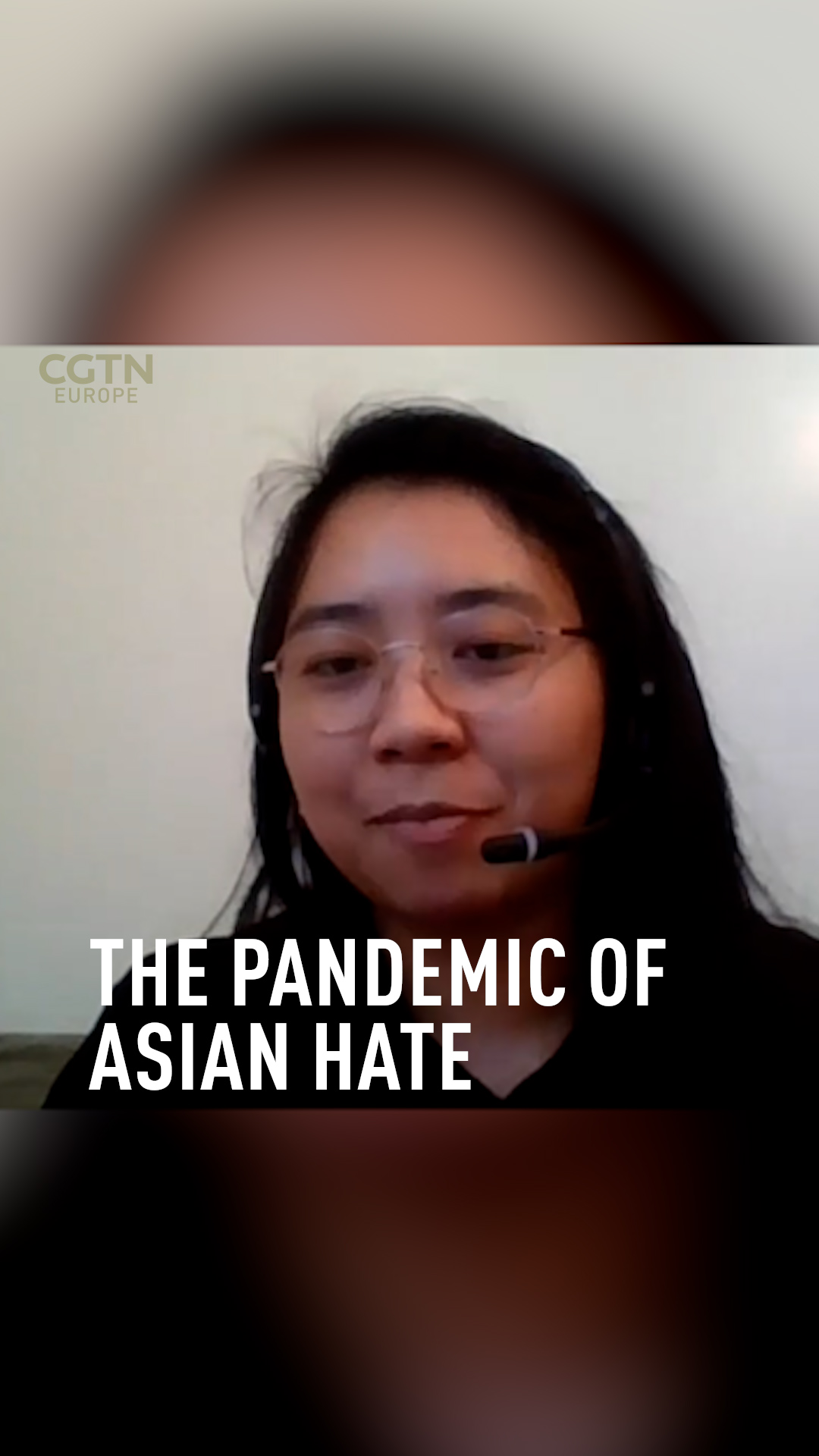01:20

What's it like to grow up in the UK with Chinese or Asian heritage?
To mark Anti-Racism Day on March 21, CGTN Europe asked two British-Chinese women – one from generation X and one from Generation Z – to share their experiences... and their advice.
The Chinese punk
Writer, performer, poet and broadcaster Anna Chen was born and raised in London in the 1970s with a Chinese father and an English mother.
"I look almost totally like my father," she smiles. She didn't feel different as a child – but as she got older, she realized people were treating her differently.
"You're being pushed back," she tells CGTN. "I grew up with a feeling of belonging and then had to get used to this disjunction in the way that you're being responded to."
Such societal marginalization could lead some to shrink into the shadows. But in late-70s London, Chen found her voice – as one of the women of punk. A pioneer in the burgeoning non-conformist movement spanning music and fashion, she was described as the 'first Chinese Brit punk.'
Personally dressed by Vivienne Westwood, she became a groundbreaking cover star on the Streetwalkers' 1977 album Vicious but Fair, dressed in leather and chains. It's a style that was widely adopted by many punks, but was particularly subversive from a young Chinese British woman.
"Being of the punk generation, we were quite gobby – women were very confident," she recalls. "It always seemed strange that I was expected to be submissive a lot of the time."

Asian women in media and advertising are often typecast as submissive. /CGTN
Asian women in media and advertising are often typecast as submissive. /CGTN
Submissiveness wasn't the only societal expectation Chen had to work against as an Asian woman. "You would be quite often oversexualized," she says. "If you think of all the images of women that we grew up with, there are a lot of loose women."
Chen's tone becomes more serious as she recalls the effects of different race-based reactions.
"If you're an Asian girl or a girl of color, you could be treated in any way and nobody would protect you, nobody was concerned. You were just there as an object.
"Women have been fighting on this front for a long time, but there's a special circle of hell for women of color, because you have a whole different set of obstacles that you have to deal with."
Writing from experience
In the early 1990s, Chen embraced her difference to launch her career as a writer, poet and comedian.
"When I realized we weren't getting decent roles, I started writing theater for myself," she explains. "I took a show called Suzie Wrong – Human Cannon to the Edinburgh Fringe Festival."
Even so, as she got older the stereotyping became a real obstacle to her work.
"You start running into walls. We know about the glass ceiling, but there are glass walls as well where you're not supposed to express yourself – we're a minority.
"The other thing is never, ever seeing reflections of yourself in the media, in politics. You know, I don't think people can really name a Chinese person in Britain. I can't think of anyone… We're a blank canvas and that means you can be projected on much more easily."

Anna Chen – writer, poet and broadcaster. /CGTN
Anna Chen – writer, poet and broadcaster. /CGTN
Around the turn of the millennium, China enjoyed a period of popularity. The country joined the World Trade Organization and began preparing for the 2008 Olympics – and as interest in China grew, Chen found herself in demand again.
"I started making programs for BBC Radio Four. In about 2007, I made a 10-part series, Chinese in Britain, and it gave me the chance to humanize the Chinese."
This was the world that Fiona Sim grew up in. She was a child in Britain at the turn of the millennium – and like Chen, she quickly felt a separation.
"From a very early age, I was made to understand that I was different," she tells CGTN. "Even at the time, I didn't quite understand why being Chinese made me different.
"It was only years later, into my teens, I would realize 'Oh, the reason why they were telling me this or they were doing this to me was because of my race.' It was an affront to who I was."
The 'model minority'
Sim explains that attitudes to Asians were being formed around the 'Model Minority' myth, which simultaneously encourages polite acquiescence and raises expectations.
"The expectation is always that an Asian person, particularly a Chinese person, has to do well," she says. "And I do well very academically – I keep my head down, I'm very hardworking and all these stereotypes.
"Another stereotype is that it's my parents – the tiger moms and strict dads who are trying to force me to do well and become a doctor. But I found it was my teachers, my peers, who propagated this myth."

Fiona Sim at an anti-Sinophobia protest, March 2023. /Elizabeth Mearns/CGTN
Fiona Sim at an anti-Sinophobia protest, March 2023. /Elizabeth Mearns/CGTN
As if it wasn't enough being expected to be a high achiever with an assumption of parental interference, Sim notes that any academic success would quickly be brought into question.
"When I would produce academically good pieces of work that were of a really significant quality for the age, my teacher was instantly turning around and accusing me of plagiarism," she says. "They'd say, 'This isn't your work – there's no way you could have written this.'
"So when growing up I was fulfilling two dichotomies of being the hardworking, quiet, submissive Asian student, but also having to grapple with the fact that people didn't believe the skills and the knowledge I did have. And it was always accredited to plagiarism or cheating or something else."
Globalization and nationalism
After the financial crash in 2008, the West turned to China for help and a golden age of globalization and geopolitics ensued. Anna Chen remembers the good times well.
"Basically, China saved the world and it did this by allowing global currencies to devalue against it," she explains. "It took a huge hit itself. It encouraged consumption at home, which meant that it started off a massive bull run.
"Everybody who has gained from the bull run from 2009 to very recently should really thank China."
The atmosphere began to sour as a wave of nationalism swept Western politics, amplified by the divisive algorithms of social media.

Social media became a toxic environment for many Asians. /CGTN
Social media became a toxic environment for many Asians. /CGTN
As Brexit fever hit the UK, an element in the British media emboldened some people to embrace a more racist rhetoric and China's swift rise to economic prominence stoked old fears of world domination.
"When you're just an undifferentiated mass, it means no one is seeing you as human," explains Chen. "It turns you into a reservoir of scapegoats that can be triggered whenever needed – and we're seeing that now."
Finding a voice – and being silenced
It was into this Britain that Sim entered adulthood. She went to university at Goldsmiths in London and found her voice.
"As an anthropology and media student, I began to understand a lot more about how things such as Orientalism worked and how imperialism seeped into every aspect of cultural society," she says.
"Because of this, I started to notice that everything from my lecturers to some of my peers would have a very negative view against China – often unsubstantiated, often founded on hyperbolic rumors and headlines that had no basis in fact and what I found was disinformation. As the years went on, I began to speak up a lot more about this on my campus."
This came to a head when Sim complained about an exhibition on the protests in Hong Kong, which she believed to be biased and imperialist in nature.
"I actively challenged this with the exhibition's curators and the people who had let this exhibition go ahead – because in my opinion and in the opinion of other mainland Chinese students who were at the university, this was disinformation. It was spreading a lot of false information, a really slanted and biased picture of what was happening in Hong Kong."

'An epidemic of ignorance is around – we must protect ourselves' says a mural by street artist Laika near Rome's Chinatown. /Filippo Monteforte/AFP
'An epidemic of ignorance is around – we must protect ourselves' says a mural by street artist Laika near Rome's Chinatown. /Filippo Monteforte/AFP
The reaction of the student union shocked Sim.
"I ended up essentially being banned from all arenas of student political life. I was refused to run in elections, I was refused participating societies, I was ostracized by a lot of my peers who suddenly decided to turn on me – because I associated myself with China and Chineseness, that was the end. They didn't trust me any more, they blocked me out completely."
For Sim, this was an instructive experience and typical of the double bind that Chinese people can find themselves in, hemmed in on both sides by stereotypical expectations.
"If I'm well-behaved, I'm a 'Model Minority.' If I resist or challenge things, I'm the 'Yellow Peril.' This is where a lot of British Asians, Chinese-British people are really having to contend with identity and almost be forced to choose where their allegiances lie."
It's the China virus. It's not the coronavirus. Corona sounds like a place in Italy, a beautiful place. It's corona? No. It's the China virus.
- Donald Trump addresses a packed election rally as U.S. President, September 2020
00:59

The pandemic
In early 2020, COVID-19 swept the world and China became a convenient scapegoat for Western leaders and media outlets, says Chen.
"China was either incompetent or it cheated – it never gained credit for what it was doing," is the way she summarizes the global reaction. "This is really sad because what it meant was we were deprived in the West of this roadmap, which meant that things just got worse for us.
"Instead of doing what we had done over smallpox and all sorts of other public health issues and gotten together with China and worked to eradicate it, instead we were getting a lot of disinformation."

Even mainstream press got caught up in blaming China for COVID-19. /CGTN
Even mainstream press got caught up in blaming China for COVID-19. /CGTN
But it was the personal nature of the racist comments that really upset Chen.
"It was the usual thing of trying to slap this image of filth and pestilence onto a group," she says. " To turn 'China bought us time' into 'China lied, people died'… it really felt at times as if there was an anti-Chinese pogrom that was being brought to the British nation. And it was absolutely awful."
READ MORE: Coronavirus sparks more epidemics: Fear, hatred and sinophobia
Sim also feels the pandemic was a turning point, when the atmosphere emboldened people to turn implicit racism into overt aggression – "Whether it was people spitting at me as I walked past or whenever I'd get on the bus during the early stages of the pandemic, there'd be almost an exclusion zone around me.
"My family experienced a lot of harassment, particularly over the pandemic. We'd get things physically, we'd get a window smashed out or kicked in. It ended with my family's home and business being a victim of an arson attack by someone who was very frustrated with the state of the country – for whatever reason, we became the scapegoat for that frustration and our house got burnt down as a result."
00:44

What can people do?
Chen believes the Chinese-British community can learn important lessons from other minority groups.
"There are all these microaggressions that other people of color have covered quite well and are very familiar with," she explains. "I've learned a lot in the last few years from the way my black and South Asian brethren have been treated – It's like, 'Oh, right, they're doing that to us now.'
READ MORE: Bridge Builders - the family that spans the globe
"I think it's really important that there should be this feeling of solidarity, that we stick up for each other as well as sticking up for other human beings. I feel like we've had all the life sucked out of us, we've had all our souls sucked out of us – you're not supposed to see us as human beings. And I think this is very dangerous for the community."
Sim feels that people need to widen their sources of information – and act for the greater good.

Don't believe everything you see online. /imtmphoto/Getty Creative
Don't believe everything you see online. /imtmphoto/Getty Creative
"Try to challenge the narratives you see in the media, try to research them, try to see the other side and see alternative perspectives," she urges. "Because if we continue the way we are, where we accept everything we read from popular mainstream news outlets at face value, the violence and the hatred towards Chinese people, towards Asian people isn't isn't going to go away.
"It's only going to go away if collectively, as a country, as a society, as a culture, we all take the effort to try and reach out, to try and build those bridges where people are telling us to build walls."
The battle against 'othering'
Sim summarizes it as a fear to be conquered: "Where a lot of Chinaphobia stems from is fear of the unknown, fear of the other," she says. "It's fear that there's a force out there that we can't trust, and that all contributes to the Yellow Peril."
As befits a high-achieving student, Sim believes that knowledge is important.
"It's about reaching out and learning about new cultures in a way that we might not have been expected to learn about them before – perhaps even learn the language," she says.
And that's no longer about hitting the books. Sim notes the increasing capacity of technology to help us all achieve mutual understanding.
"There's so many Chinese YouTube channels, Chinese TikTok, trying to spread awareness about the culture and what life is actually like in China, including vloggers on YouTube," she says. "I would encourage people to not be afraid to try out, looking and reading different sources and pushing past that discomfort zone.
"Make that informed decision for yourself on China. Don't let the media tell you what you should believe and what you should think about a country that is thousands of miles away."

Getting to know people doesn't take much more than an open mind and the time to talk. /Pixta/CFP
Getting to know people doesn't take much more than an open mind and the time to talk. /Pixta/CFP
There are also many organisations in Britain that promote education about Chinese history and culture. Jenny Clegg is the Vice President of The Society for Anglo-Chinese Understanding (SACU), having spent decades working with Chinese people, Clegg has found you don't need to worry too much about making cultural mistakes.
"Just be yourself, be friendly. Get to know people. Chinese people are very willing to share their culture. They're proud of their culture, their history, and they want other people to enjoy it.
"If you go and celebrate Chinese New Year in Chinatown, you'll see people having a good time – you can just join in and have a good time and see the lion dance and sample some Chinese food.
"It's really a matter of just trying to get to know China and Chinese people and culture and civilization better, and having an awareness of how these stereotypes distort our vision and create a gap between what we think and what is actually Chinese."
READ MORE: Meet the Bridge Builders improving understanding of Chinese history and culture